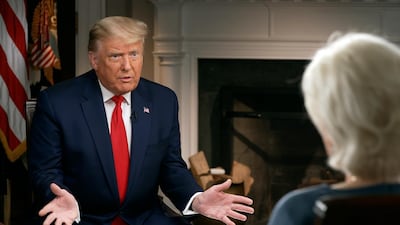With just nine days until the US election, President Donald Trump and former Vice President Joe Biden have laid out their competing visions on CBS’ iconic 60 Minutes programme.
An audience of nearly 10 million Americans tuned in to the two interviews, although Mr Trump’s campaign team pre-empted CBS by posting an unedited 38-minute version on Facebook, on Thursday.
Reactions have been as polarised as the bitter divisions across the country, with Mr Trump cutting short his interview and walking off camera after saying, “I think we’ve had enough of an interview here.”
His defenders claim Vice President Mike Pence had just arrived for his 60 Minutes slot, after an aide was heard to remark, “Hey, we have the veep in five mins.”
Either way, the interviews may not be as influential as the respective campaigns hope.
Ratings were far behind previous 60 Minutes slots, including President Elect Barack Obama's November 2008 interview with Steve Kroft, which focused heavily on US policy in the Middle East, attracting a record audience of 24.5 million viewers.
By contrast, foreign policy was remarkably absent this time round.
The ratings were also well behind the final presidential debate, which attracted an audience of 63 million viewers.
Much like those chaotic exchanges, much of the discussion was side-tracked by allegations of foreign meddling and the foreign business interests of both families.
This left both interviews to focus on domestic issues, including the handling of the Covid-19 pandemic, healthcare and the economy.
Arguably, Mr Trump was most vulnerable in this format. Much of his interview descended into arguments over whether Covid-19 cases were going up because of increased testing or whether the pandemic was out of control.
Mr Trump batted off many of Lesley Stahl’s questions with flat denials, including the allegation that he had called Dr Fauci “an idiot.”
Ms Stahl’s line of questioning also turned to some of Mr Trump’s allegedly inflammatory language, which critics accuse of being intentionally divisive.
Ms Stahl referred to the chant “lock her up” during a rally where the President referred to Democratic Michigan Governor Gretchen Whitmer. The chant was popularised during Mr Trump’s 2016 election campaign against Hilary Clinton.
Mr Trump had remarked at the rally, “lock them all up” but he firmly rebutted the accusation.
"Lesley, that's such a vicious thing you just said. I didn't say lock up the governor of Michigan. I would never say that. Why would I say that?” he said.
Perhaps the testiest exchange revolved around allegations that incriminating information had been found on Hunter Biden’s laptop, which purportedly contains evidence of foreign collusion and illicit financial dealings in China and Russia.
Mr Trump’s campaign team claim the laptop was handed to his lawyer Rudy Giuliani by a laptop repairman, who in turn claims the device had been left in his store.
Mr Trump appeared to contradict himself as Ms Stahl claimed the allegations were deliberate misinformation.
“I don’t know anything about that, I just know it’s a laptop,” he said.
Mr Trump nonetheless managed to hold his ground and expand on some critical issues that will define the next decade, including US competition with China.
“They're an adversary. They're a competitor and they're a foe in many ways,” he noted.

Expanding on the global pandemic, Mr Trump repeated his claim that the crisis was due to a failure on the part of Chinese authorities.
“They should never have allowed this plague to get out of China.”
By contrast, Joe Biden was widely perceived as calmer in his interview with Norah O'Donnell.
This could be a double edged sword, as the Democratic contender expanded on his economic vision for the US, which Mr Trump’s campaign is portraying as a backdoor for more radical democrat policies, including “progressive taxation,” supported by Congresswoman Alexandria Ocasio Cortez.
When asked how the US would pay for trillions of dollars of extra social spending, Mr Biden remarked, “by righting the tax code. You got billionaires in this country making $700 billion during this crisis."
By contrast, Mr Trump warned voters, “they’re going to raise taxes…They’re going to do things that nobody would even believe. It’s radical.”
This was a rare moment where Mr Trump was able to go on the offensive, in contrast to Mr Biden’s calmer demeanour, which enabled him to bat away allegations of corruption surrounding his son by simply dismissing the claims as a “smear campaign.”
In what could not have been a starker contrast in style, Mr Trump cut his interview short. As he walked off camera, Ms Stahl’s parting words were “be careful.”
However Americans perceive the two contenders, one thing is clear: Covid-19 has been a hammer blow to the American economy.
Voter perceptions of how Mr Trump has handled the crisis are unpromising, with an October 8 Ipsos/Reuters poll suggesting only 37 per cent of Americans approve of the President’s handling of the pandemic.
This is not likely to matter to Mr Trump’s base, and even if those figures are accurate, the President may yet be boosted by the Electoral College system, which helped deliver his historic win in 2016.




















